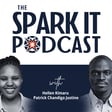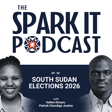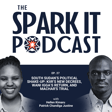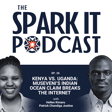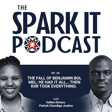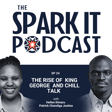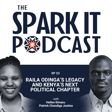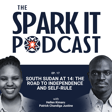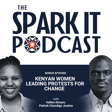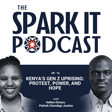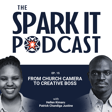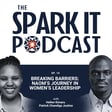Become a Creator today!Start creating today - Share your story with the world!
Start for free
00:00:00
00:00:01

Landing First Jobs: Truths No One Told Us
In this episode of The Spark It Podcast, Hellen Kimaru and Kimzy open up about landing their first jobs, the struggles of job hunting, the pressure to stick to a career path, and learning how to speak up at work. From night shifts to nonprofit work, they share personal lessons about soft skills, setting boundaries, and why starting from the bottom isn’t failure. If you’re job searching, new to work, or building your dreams from scratch, this episode gives insights you might find helpful.
Transcript
Introduction to Spark It Podcast
00:00:00
Speaker
Welcome to the Spark It podcast where we bring you inspiring conversations that spark an interest for you to do more. And ah on today's topic, we want to sort of dive in into our job search experience as landing our very first jobs.
00:00:15
Speaker
And navigating ah the workplace as young women and how sort of that looked like for us when we first got like our very first jobs. So, Kimzy, welcome back to the podcast. Thank you so much for having me.
00:00:30
Speaker
I know, it's been it's been so nice. By the way, guys, Kimzy has actually a YouTube channel. It's called... Likia's Touch. Yes, find her on YouTube. It's called Likia's Touch. She does a lot of DIYs and also she has like great conversations on her channel. She's actually doing amazing things and I'm excited that she actually made the time to you know appear on the podcast for the third time.
00:00:54
Speaker
Yeah, true. a That's so many times. I know, but we I think we have like sort of a lot of things to
Path to First Job
00:01:00
Speaker
unpack. Yeah. true So, so ah could you tell us like how you are first, how you landed your first job and how that experience was initially, especially on the job search, how long maybe did it take you to even land like your really first job?
00:01:18
Speaker
um So my first job was in a contact center. So I feel like I've been doing contact center for the longest, like part of the entire of my adulthood. yeah But before that, I used to do the small hustles. I used to do the brand ambassadors promos.
00:01:37
Speaker
They're very easy to get in Kenya, especially after campus and everything or in campus. So after that, after college, I did the promo that was giving me money. ah for the weekends, but now come for um my first job. I really did a lot of applications here and there, but getting job was not easy.
00:01:56
Speaker
Getting a job, it hasn't been easy. I don't think in the country that we are in at the moment, getting a job is easy. So I believe in and networking and connections because for my first job, it was a recommendation.
00:02:10
Speaker
So my big broad recommended me to um a company that was the smart banking solution, which was dealing with DTB ATMs.
00:02:21
Speaker
And that's how I landed my first, my very, very first job as a kind of ah call center agent or or customer service representative. Oh, wow. That's amazing. Yeah. yeah I think you've spoken some power into how even your networks can sort of help you get connected. Because I believe you know even right now, like, um,
00:02:41
Speaker
Do the job search? it's it's It's hard. Like getting a job, landing a job is very hard. I see people even right now on LinkedIn, like they put those banners for open to work.
00:02:52
Speaker
You keep applying. Honestly, even myself, I've gone through it. i haven't I haven't secured so many jobs in my life. And partly it's because i was an entrepreneur or I have been an entrepreneur for quite some time.
00:03:05
Speaker
But for me, I would say like my very first job, um There's this organization that sponsored me through the university and I remember they used to have for they used to hold workshops for us.
00:03:17
Speaker
I remember there's this particular workshop they did, i think it was called, it was called um I think something Diana. I don't remember what Diana, but there was something Diana. And what happened is they would teach us how to do job search, like how to write a good cover letter, how to write a good resume. resume And then they would tell us that you need to narrow down your where you want to work,
00:03:39
Speaker
um which counties you want to work, which companies you want to work to, to work in, I mean, and then you now start, like, sending your applications to those companies or looking if they have vacancies on maybe their websites.
00:03:51
Speaker
But honestly, i think even after going through this workshop, but I didn't necessarily, um like, sort of go through the hassle of finding the job. Because what happened in our very final, as we were graduating from the scholarship program, our very final workshop, I remember the person who was in charge of the workshop that day, she announced, she was like, oh, by the way, we are hiring. We are hiring for program assistants. And trust me, at that particular point, I felt like I didn't even even stand a chance.
00:04:20
Speaker
I didn't feel like I would actually make the cut. And when they announced this job, I don't know, something in me told me, just try your luck because sometimes we don't get stuff because we don't also try.
00:04:33
Speaker
Like we we sort of cut ourselves off from um opportunities. without even somebody else saying like, hey, you're not qualified. So we disqualify, yes, that's
Career Path Challenges
00:04:43
Speaker
the word. We should change ourselves. Yeah, we should change ourselves. We disqualify ourselves before anyone else has disqualified us. So for me, at that point, my spirit was telling me just apply.
00:04:53
Speaker
And I did apply. And with this scholarship program, there was people who were kind of very outstanding that you would have thought they would be the ones who easily get the application, ah maybe the job. Yes, the opportunities. Yeah.
00:05:04
Speaker
Because I even remember the lady we ended up working with, Rose is her name. I remember even her she was telling me by the time she was applying she kind of felt like let's let me just try I might not even be picked but at least say I tried yeah so we did try and we applied and I remember ah I remember at this point when I was applying I was doing my attachment which is like internship in the Kenyan context it was my final attachment at the uni and i had like a couple of weeks he left to go I think around three or four weeks.
00:05:35
Speaker
Yes, and I remember even as I was doing this internship, I had to actually ask for permission to go for the job interview, but I didn't even tell them I was going for the job interview. Yes, so i i park and go. I was living in Eldorite at the time.
00:05:49
Speaker
I park my staff and I come Nairobi. I come and attend the job interview and then in the evening, because asked for just the days off, In the evening, I'm back on the road and the next day, um I wake up to go to the day job.
00:06:02
Speaker
So a couple days later, they call me and they're like, hey, by the way, you got the job. I'm like, oh my God, this is exciting. So that was my journey, working or getting to work in the nonprofit sector.
00:06:13
Speaker
So I got employed as a program assistant and that's it. I think it was more about me just taking a chance on myself. yeah and Yeah, taking a risk, yeah. yeah oh that's nice but also i feel like when it comes ah to job search especially when you're fresh from campus or you don't know anything yeah and um the idea that you went to school you did this course so we i feel like we're fixated on that career path yeah so you're afraid of
00:06:45
Speaker
ah branching to get some other different type of job. So you're literally focused on this is what I did study for. This is what I i want to pursue. Yet, at that moment, you know there are other opportunities that you can't be able to branch to.
00:07:01
Speaker
But I don't know whether it's fear or something or it's just um ah a mindset that is planted towards that now because this is the career that you chose, this is the path that you should follow and everything.
00:07:15
Speaker
But again, you end up realizing that the things that you even did study are not the things that you you're going to get work with or you're not going to work in the field that you did study for for some time, you know, especially when you're starting.
00:07:30
Speaker
Yeah, I definitely hear audio and ask. Now wanted to ask, when you got your first job, you said it was a program assistant. Is that what you did in campus? No, no, no, no.
00:07:43
Speaker
Actually, in uni, I did um i did travel and tours management. And if you asked me when I was actually doing this course, I would have thought that one day I'd be sat behind a computer.
00:07:55
Speaker
booking flight tickets for people traveling around the world or maybe something like that. Yeah, so that's that's exactly what I envisioned myself working. But as you've said, i think sometimes when people are in school, it's also a mindset.
00:08:08
Speaker
I think growing up, ah there is a particular path we wash on like, oh, we want you to become doctors, we want you to become this, this and that. So people pursue that. And by the end of the day, when you get out of uni and you're not getting an opportunity, say you wanted to become a doctor, you've gone to school, you and now you have yeah a skilled doctor, but you don't get like the opportunities.
00:08:30
Speaker
A lot of times I feel like even right now, people end up at home stranded not knowing exactly what to do and that can limit their options so I can I think like even what you're saying like for you even you did fashion and design right true yeah and you didn't even your first job was not in fashion and design not at all it was what right promotions yeah brand ambassador for EABL actually oh wow Look at you.
00:08:57
Speaker
they used to work at night. Yeah, we used to do ah night shift. That is Thursday, Friday, Saturday and Sunday for the weekends. So most of the times, Monday, Tuesday, Wednesday, wasn't working. Then the job will boom on Thursday, Friday, Saturday and Sunday.
00:09:10
Speaker
And that is night shift, you know. And then you'll get paid for that day. You'll be promoting a good, um a beer um or a new bottle whiskey or something, you know.
00:09:24
Speaker
So it all depends with what was ah in the market at that time for EBL. Yet, I had um done fashion and design. i know. So I was thinking, how once I'm done with, when I went to do fashion and design, I was thinking, once I'm done with this, I'll be the greatest stylist i'll start with having a fashion house that you know that was the idea i had then came i i came out of the out of school now to the world and then i realized oh wow things are valid though i know i know i i actually i'm i'm going back to that i've been
00:10:01
Speaker
trying to pursue that. Makes sense. for So yeah, like that was sort of your first job in the context of like a part-time job until now when you got the role that you were referred to. ya Yeah. Yeah. After ah now ah going to the smart banking solution. Mm-hmm.
00:10:18
Speaker
where I worked for four years. Yeah, I did work for four years that company. And then now I moved to the other one, which I'm currently at and still doing the same, almost the same thing. But now at the moment, I'm doing customer service for telecommunication that was for banking.
00:10:34
Speaker
Now this one is more into the telecommunication field.
Importance of Soft Skills
00:10:37
Speaker
Do you feel like you are well equipped when you like sort of even this job that was more permanent, leave alone the promotional job, did do you feel like you are well equipped to get started in the workplace or how was it for you?
00:10:53
Speaker
um To be honest, I wasn't well equipped, honestly speaking. However, having I feel like um the public speaking part made it easier for me because now I had already ah had the public speaking.
00:11:07
Speaker
ah had soft skills here and So I believe that um even when I was doing ah the um my studies, the small, small soft skills like knowing how to use a computer, knowing how to do um Google sheet and spreadsheet and everything. Those small, small skills, they created um a base for me when now it came to um the other part of the first permanent job that I got. yeah Because again, for them, it was a connection job, as I said, I was connected to them.
00:11:37
Speaker
But now when I went for the training, they were checking more into the soft skills. yeah So they're checking on your confidence, your um eloquence and how best you can be able to to speak to people. And then the checking, are you able to now ah navigate through the Google space and um using a computer? Yeah.
00:11:56
Speaker
So I feel like having those ah soft skills because also at school we had the um i t as c well ic yeah We did ICT as a unit at school. year So i feel like that ICT is what gave me the basis of this job. But again, honestly speaking, I wasn't equipped for that.
00:12:17
Speaker
Makes sense. And now that you have actually mentioned soft skills, I do remember like when I was in the uni, um there were students like, for example, I was lucky to have owned a laptop early on.
00:12:28
Speaker
And I remember there were, it wasn't like every u student was lucky to have one at a time. True. I don't know whether other things have changed right now, but it wasn't the same. So I remember there were students who would come to maybe you and they're like, hey, could you type my assignment out for me? I feel like there ares some people who left even uni, sorry to say, they left the uni without necessarily some of those best soft skills.
00:12:51
Speaker
And what I would say from this conversation that we are having, having like those soft skills like knowing how to use your computer, these like very basic things like software, like knowing how to use Word, to navigate the Google workspace and all this kind of stuff, it's what sometimes sets you apart because Sometimes you could be very you think you're going to the uni, you've studied maybe like tourism, but when I put you behind a computer and I tell you to start booking tickets for people and you need to use a computer, you're not so good. And also it's because they also the education system, the way it's set up in Kenya, it's not like computer studies are available to all students are around all schools. It's actually a very important skill, but it is not that available and accessible. yeah So I think soft skills,
00:13:35
Speaker
ah people should take their time to take their time when they're still in campus, in college, in high school, to build on their soft skills, including communication and and stuff like that. It kind of prepares you for the workplace because I feel like these ones become automatically transferable. It's something that you can utilize immediately. And then some of these the things you can learn as you you know as you continue working wherever you are working.
00:14:03
Speaker
I agree with you. yeah so I feel like soft skills are things that everyone should learn even way before, like it' from a high school, college, campus, soft skills should be the major thing that you concentrate with because again, As I mentioned, if you apart from the the well-known careers, as you mentioned, doctor, lawyers, you know, those are the major ones that um people focus with, Sana. So the others, you find that you can be able to work in any field. As long as you have the um soft skills, you can be able to work in any field, even if it's not what you did study for.
00:14:41
Speaker
Yeah, exactly. exactly And so now when you started working at the workplace, did you at your first whatever job, the one, the SmartLink or whatever one, did you feel like really supported the workplace, whether it was your boss, the people at the workplace?
00:14:59
Speaker
Did you feel supported as a newbie now that it was your first time being in a very formal job? ah For that company, honestly, that is the from ah it was the perfect um tribe that I ever had. Those guys were very accommodative, very supportive. Because i remember when I joined ah that, I did training for like two weeks.
00:15:20
Speaker
And then they now, they the entrusted me and they were like, you know what, after this training of two weeks, we believe you can be able to do this by yourself. So I had my first, my very um first night shift alone in the office. yeah But the bosses were very supportive. My co-workers were very supportive. All my colleagues, they were amazing. Like the support I got with the guys, Lord, I've never, I've never felt...
00:15:46
Speaker
like the feeling I had, I usually call them family, even up to now. I worked with them for four years. yeah So even up to now, i can be able to call them and we we can go out for hangouts.
00:15:58
Speaker
Our boss was one of the amazing people ever had because he used to be like, what is bothering you? What is not happening? what is not happening ah You need more support.
00:16:09
Speaker
Do you need someone else to come to that shift so that you can be able to be two of you for the same shift? Is there something that you need to learn? is that you know like And he used to even come and listen to the calls, watch the ah reports that you're doing, correct you.
00:16:24
Speaker
like I call them a family. that That was amazing. That is the biggest support I've ever had in a workplace. Oh, that's nice. i mean I think for me, my my experience honestly was, i think it was a bit neutral.
00:16:38
Speaker
wouldn't say, honestly, now looking back, I can't say it t was bad, but also i can't say at that particular moment, I think I didn't know what I wanted. For example, on a personal journey.
00:16:51
Speaker
you you You are starting work, it's your first time. And especially there was a time I was sent to a very remote area in Kenya, West Pokot, to work with some girls rescued from early marriages and FGM. Honestly, this job, it kind of, I think it it put me on the spot.
00:17:06
Speaker
It's like I had to figure a lot of things out because we were sent, the two of us. And I don't remember us being given like enough orientation to go for that job. So I feel like I was bootstrapping. It kind of felt like i need um I needed to do a lot of things on my own and to figure a lot of that on my own.
00:17:25
Speaker
So I feel I wasn't necessarily so well equipped or necessarily that well supported. so But that's why I kind of think it was a blessing in disguise because it came to...
00:17:36
Speaker
It kind of taught me a lot.
Growth through Job Challenges
00:17:38
Speaker
And eventually, even when I started Latitude Zero Opportunities, like all those nerve soft skills that I learned on the job are the ones I carried into my company. Because as I said, this job threw me into the deep end. I don't think I was given enough orientation.
00:17:52
Speaker
And I had to figure a lot of things out because we were working with partners. We working with ah very, very big partners around there in terms of yeah organizations other organizations that we had partnered with.
00:18:03
Speaker
ah and you are running a skills training program for 100 girls. I remember like even in the morning, for example, but while I was working there, I realized that it would be important for the girls to be waking up early in the morning to go for a morning run.
00:18:18
Speaker
Because if they don't keep fit, things will just not, you know, I felt like it was good for their health. So every morning I would wake them up at 5, and it was religiously, would wake them up at 5.
00:18:29
Speaker
we would go running for We would run for, like I think it is two kilometers one way, ah return so we would run for four kilometers. And it's in the morning, like around five-ish. And then we would come back. then There was a small field just around the hostel.
00:18:45
Speaker
Then there we would jog on the spot. we would do a lot of stretching and a lot of other exercises. So that's not like something I waited for somebody to necessarily direct me to do. I kind of just thought that it was necessary. And a lot of other things that we figured out with the girls together.
00:19:00
Speaker
So I feel like for me, it was more of, here it is, do it and try it out. trade out And now looking back, I feel like if I had known exactly what to look forward to,
00:19:12
Speaker
I feel like I would have given more to their jobs. so I could have done a lot better. Yeah, true. So from what you're saying, you um for you, you and you had to come up with your own structure of how to run the entire job Like for that time, you you're not given specific, like you see the way they, they, they like give you, I don't want to use the word manual, but they give you like a structured.
00:19:40
Speaker
There was a structure, like ah I think there was a structure of doing it, but what I'm saying initially when who were being deployed there, we were not given proper orientation. So it's like the, the structure that is sort of there.
00:19:55
Speaker
It's more of per se, like it's those things maybe you would hear from afar. It's not like it's something that somebody has sat you down and showed you exactly how to do it. Because I remember there was a meeting I attended once.
00:20:07
Speaker
And you know i have ever been in a meeting and you're wondering, oh, I'm supposed to be the one deciding? You get like you are meeting with other people and do you realize, oh, I have this much power. Yeah. so there was structure, but the structure was not communicated.
00:20:24
Speaker
No, it was not well communicated in a way that for me now I knew exactly. this is what is supposed to happen from day one to day last. So a lot of those things even I realized way later is when I'm like, hmm, interesting. So what I'm saying is, i think if it had been communicated better, i would have been able to do a lot better.
00:20:44
Speaker
And my point is I think what I'm trying to say is when you go to a specific workplace, because also I think that time never used to know how to ask questions in the right way. But what I'm trying to say is when people get employed somewhere, if you feel like something is not so structured,
00:20:59
Speaker
Ask questions questions yeah very questions so that you can know, even ask for your deliverables, what are the expectations people have for you, so that everything can be so defined and you know what to expect, especially it really if you're just getting started with with work and it's your first time working somewhere, you've just finished
Financial Literacy & First Salary
00:21:18
Speaker
uni. true Yeah, true, I agree with you.
00:21:21
Speaker
Yeah, we should ask questions, a lot of questions, it's true. I know, make sure you understand everything. everything yeah Yeah, true. ah For you, for example, when you first got your first salary, how did that feel?
00:21:34
Speaker
Hmm.
00:21:37
Speaker
I guess I've already told you this. but So for me it felt like ah I joined the company in the middle of the month. And usually when ah when they do that, um the for us, they they requested.
00:21:51
Speaker
So you joined in the middle of the month. Would you want us to pay the half payment for you for the month? Or we just wait and then ah just... ah because the the other half you're already training. yeah It's just training and everything.
00:22:03
Speaker
Do you want us to make to make the payment or we just join it with the other ah the next pay? So for me, I was like, hm yeah, we can do that. As long as there's transport for the other mile for that the time that I'm coming, then we can be able to do that. So I was expecting um asc assert a good amount a good amount of money for that for my first salary. However,
00:22:26
Speaker
When I got the money, the i don't and it collided with something else. The important thing was okay happening. and Now you're getting to how you use the money. like it got it got It collided with something else. So I never felt the sweetness of the money, actually. You never enjoyed I never enjoyed the money. But i had ah ah it was um amazing now checking on my bank. Now I even have... i have a bank account for the first time because ah the other times we were getting our money through M-Pesa's, yeah, for the promotion.
00:22:57
Speaker
So for this main job, I had to have a banking ah account. So I'm just checking on my banking account and there's some zeros. And i was like, oh, it was exciting. i I felt very important.
00:23:10
Speaker
Wow. It was a great feeling to, like, just see the the job that you've been doing. Your efforts are yielding some, you know? Yeah, it was great. It was an amazing feeling.
00:23:21
Speaker
Honestly, for me, when I first got my first pay, I think I was being paid like $20,000 actually. Just $20,000. And I was already living by myself. So trust me, budgeting this money, hey. It was tough. It was tough. It was a hassle. But I managed it. But I think the same way you said, the feeling of going to the bank and the seeing money you have worked for. Satisfied. It was so satisfying. You're looking at it, you're like, um convey um i can be productive. I know, right? Somebody can pay for for my for my services.
00:23:52
Speaker
yeah True, true. That's sort of how it felt. But now let's now go to the question of, we were talking about spending. um Even anyway, you you said you had something important, you used your money to do to do stuff for.
00:24:06
Speaker
For me, I can't even remember what it was, but it could have been like bills mostly. Yeah. But anyway, eventually, how did you navigate like budgeting for your salary?
00:24:17
Speaker
Did you find a balance? Were you saving? Did you feel like it was too little? Were you going out? now that you have and you're like, yeah, I'm excited. I have money. Let me go out.
00:24:28
Speaker
Actually, was the other way around. For me, ah i guess I've been into money... ah like how it money literacy from way before by fire by thunder by is it saying thunder by fire financial literacy for me came in from a very young place up stage. Yeah. Because learned on how to like, use every single coin I have and account for it. Yeah. So like for me up to now I account for every single coin, you'll see me with receipts, you know, sitting down and doing calculations. ask me
00:25:04
Speaker
I account for every single shilling. Yeah. So when it came to now having huge amounts, I had now this idea of like, oh, I can save this much, I can do this.
00:25:17
Speaker
And then that time had, because of the promotion jobs that I was doing, so I and didn't have the party mood and stuff. But now I was now You were so told. Yeah.
00:25:28
Speaker
But now I was more into the idea of I want to settle by myself, for want to live by myself. I want to... So the the the first few months, I started now purchasing things little by little so that I can be able to move out.
00:25:41
Speaker
And then I started placing money aside for this is for rent. This is for food, this is for family or you know you have to chip in somewhere, this is for emergency. So for me, saving wasn't um um a a huge task for me because I felt like had enough. So i was feeling like I have enough money to to use.
00:26:07
Speaker
And now because again, I'm not um i'm not a party person. and So there you you wouldn't say that I'm wasting money with some other things. yeah So for me, it was easy. I decided to save some amount and I decided to move out.
00:26:22
Speaker
So the first two months after after the first one, the salary that I never enjoyed, the other two, I saved like like genuinely saved almost the entire amount. I remember I used, i didn't even buy new clothes.
00:26:34
Speaker
Actually, when I started work, I was given outfits by her because she was in ah in an official field already. She had gone for an unofficial field, yeah so she gave me her outfits. But when I went to the job, again, I realized it was just smart casual. yeah So again, I didn't have to buy new clothes. um and didn't But now I had to save for different things.
00:26:55
Speaker
And I guess that's how I developed my saving culture. Wow, you are lucky girl. So but for me, honestly, it was bad. And I think a lot of people struggle with this actually.
00:27:06
Speaker
um Because you get your first job, you're getting maybe that small salary. Honestly, I would say I had all the financial literacy I needed. Okay. okay But what happened for me was the responsibility that came with me earning money. i would say there were a lot of responsibilities. And also it was small money.
00:27:25
Speaker
So... You would budget and budget and budget, pay for all your bills. At the end of the day, there's nothing left. i remember there a time I had fooled myself that I would be able to save $2,000.
00:27:36
Speaker
But any time people I knew called me for i emergencies, I would feel the need as if I needed to sort them. You didn't know how to say no. i far Yes, exactly. First, I didn't even have boundaries.
00:27:47
Speaker
yeah money Boundaries is something I have learned way later. and never i used to have boundaries. And also, I had this sort of, I don't know whether to call it a severe complex mentality or whatever. You feel like now that you've gotten a job, you can solve everyone's problems. And I feel like a lot of young people are actually going through that. Some could also because of black tax.
00:28:09
Speaker
Like there's people who have a lot of responsibilities at home. And I would say partly I was also one of those. Like you have responsibilities and the money is not it's not like it's a lot.
00:28:20
Speaker
And also I've seen people who even earn a lot of money anyway. But again, the black tax is killing them or the financial responsibility could even be other things. Like it's sort of draining their accounts. So that that sort of happens a lot. And as you've said, for you, you are lucky you could be able to find a balance. And what I would tell people out here, it's okay to help.
00:28:40
Speaker
True, true. It's okay to help, but also it is important to build boundaries. Because if you're only starting a job and you don't have boundaries, then eventually one day you might go broke and you will call these same people and they'll be like, hey,
00:28:56
Speaker
What were you doing it your money with your money? I know, I know. Very true. And you helped them. Yeah. they don't remember that part. They don't. Yeah. So, yes, I think helping has to also come with boundaries in terms of you need to know, like, especially that now that you talked about a budget, you have to budget your money in a way that eventually, uh, you can eventually, eventually you can be able to sustain yourself.
00:29:19
Speaker
So yeah you're still able to help other people. or if it's your parents, it's your siblings, whichever way you want to come through for your people. But have a budget where you have like, this is a budget for helping.
00:29:30
Speaker
And once this budget is exhausted, I'm not gonna maybe say, touch my savings. Yeah. And then have that sort of financial discipline, like Kimzy has mentioned the way she has. But they, for sure sure, it's true. hashi She ah budgets. Yeah. So, as I was saying, she she budgets her money up to now. Yeah.
00:29:47
Speaker
Yeah. True. You learned the hard way. Yeah. Like... Like, in life life teaches you things, like, you know, the lessons that you have to learn in life. Because, i as again, from the childhood, you could have, like, 10 shillings and you're budgeting for that 10 shillings.
00:30:05
Speaker
You're like... Papa, we're going to buy mboga today and do this, do this, do this. Like, you know, so you have to, I learned to budget my money from way before. So that because I need, and I sure did not have like the luxury of wasting that amount. You know, yeah the way like an a young child will get, um will be given 10 shillings and their thought their first thought will be, Let me buy candy. Like now if I give my son money, okay, I'm teaching him how to save. So I'll give him two coins and just test his his brain and see what he'll he'll do. So he'll have a guinea ah bigy ah piggy piggy bank. yeah So he'll take one coin to the piggy bank and then the other one he'll tell you I'm buying candy, you know? So and unlike him...
00:30:57
Speaker
mayha When you gave me this coin when I was young, and cand i already know we need... No, for us, when we were growing up, someone gives you 10 shillings, wow, like we have 10 shillings for nyanya. For tomatoes. For tomatoes, yeah.
00:31:10
Speaker
You know, so having come from that... Come to think of it, there a time we were walking to church, one of those fine days. And then... You were slapped with the 500. Yes!
00:31:22
Speaker
It was not superstition. there was ah It was a windy day. Tell me why. and a 500 shilling note new slaps me on my face. I know, right? And then you take it home mom and dress she budgets the money. She budgets the money.
00:31:37
Speaker
I know, right? No, we needed it. Yeah, we did. like but it if it was someone else, you could have polter the church. In church, you could have eaten chips on the road. know, right?
00:31:47
Speaker
But now, see your life. You have you didn't even... give offering for the 500 bob. Oh my lord, where would I have to get a change?
00:31:58
Speaker
Yeah. But yeah. So having come from that, we knew, i feel like, um, us, we had that, uh, responsibility of learning how to budget the money.
00:32:10
Speaker
So it's something, oh, for me, yeah, for me, I, I had that, you know, I started planning Kutoka Kitambo from way before. Honestly, I think you are lucky. For me, I think it's the guilt tripping I was doing in my head.
00:32:24
Speaker
There's also that aspect for when it comes to your money and also helping people who really need it in your life. And also something else I feel like um had to affect you is that the fact that you started way before some of us. yeah So you started the little amount you were earning way before. Now that you have already been giving and giving and giving, even when Personally, I started working for you. you have You had already built that culture of giving. So people will be more inclined to you for requests and, um you know, more than me.
00:32:59
Speaker
No, I would choose to think it's not right. I think you had boundaries. ah I think you had boundaries early on because it doesn't matter. I think in families, for example, even if I started working earlier than you At some point, as long as you're working and people need your help, they still come to you. So I think it depends on how good are your boundaries. Can people shake them?
00:33:20
Speaker
Because if you don't have those boundaries, people will definitely ask, ask, ask. They'll never stop asking. And as I said, disclaimer is ah helping is nice, but have boundaries around it or else you'll drain yourself. you so but so You can't solve everyone's problems. True.
00:33:36
Speaker
For me, I know how to say no and not look back. For her, she'll be like, oh, I don't have money at the moment. Not now, then. Oh, then. She used to be like, you borrow, and she's like, I don't have money at the moment. You want to feel guilty. You want 2,000? I don't have 2,000 at the moment.
00:33:51
Speaker
I can give you 1,500. Let me check. So she used to promise. And now, if you promise someone, I'll keep asking until now. Expectations. Yeah, you see? So yeah if I tell you, kindly assist me with 1,000 bob. If you don't have, for me personally, I'll say I don't have 1,000 bob. That's it.
00:34:07
Speaker
that's it For her, she'll be like, at the moment I don't have the 1,000, but let me check by the end of the day. You see? Or let me check on how much I can be able to raise. that's yes Yes, yes. And as I said, i didn't have boundaries and I used to feel guilty.
00:34:21
Speaker
As I said, I had like this idea as if I was supposed to solve everybody's problems. thats And I was not focusing on myself, which kind of really did affect me early on in my career. True.
00:34:33
Speaker
Wow. But anyway, for example, for anyone out here looking for a job and maybe it's their first time they've just gotten out of uni or campus, whichever, a college, they've done their diplomas, their certificates, or maybe even want to start business or something like that.
Advice for New Job Seekers
00:34:51
Speaker
ah What would you advise them about, and not in a business, in the context of job, what would be your advice about navigating like the job search? Mm-hmm.
00:35:01
Speaker
or settling in into a job, what would be like the biggest advice you can give them? um When you're doing job hunting, first of all, don't let that um mentality of career path block you. Okay. Just be open to getting any kind of job and also be ready to work.
00:35:25
Speaker
All right. Something else I feel like do not be afraid to start from below there. Yeah. From the bottom, because I feel like a lot of people feel like, Oh, you get someone who's like, they'll give you a story and they'll tell you for me, I started ah as a janitor in that company.
00:35:41
Speaker
Then I went from janitor to a a different department, maybe started cooking coffee. Then from there, I went to the administrative field. yes And then they keep on growing, growing, growing. And now they are CEOs. or you know yeah But for us, I feel for the young people, we have that foundation.
00:36:00
Speaker
fixated mind that we have this is what I cannot be... you know I cannot kind start that from the bottom from the bottom. I cannot start from the bottom. It's beneath me. yeah Just because my papers read that I am a certified ah customer service rep, I need to be there.
00:36:15
Speaker
Just because I'm a leader in this... filled and this and this, I need to to start from there, you know. So I'll advise you, first of all, don't be, apply for any job, yeah? Don't be fixated with the career path.
00:36:28
Speaker
Just apply for any job that you're able to see, as long as you have the skills, yeah? And again, do not ah feel intimidated just because you did this big career, but you're doing a job in a very different, a very different ground, or, you know, because I feel like, again, some of us have the,
00:36:47
Speaker
ah idea that I need to sit in an office seat. I must work in an office setup. Yet you can be able to start somewhere else where it's not um an office setup, just a different place.
00:36:59
Speaker
You know, don't be fixated to one specific thing. Just have a broad mind, open an open mind, because you can learn with soft skills. I believe that you can be able to navigate any job you're given.
00:37:11
Speaker
As long as i it doesn't tell the... so it' something critical like medicine and you know I feel like with soft skills you can be able to navigate anything. anything Yeah and also I think for me it would be you talked about networking like for example somebody got you your like very official job I feel like building on our networks and sometimes our networks could be like the people you go to school with your classmates at the university at the college or whichever level or even your high school classmates like build strong friendships and networks out here so that even at your time of need when you are sort of looking for a job, you can probably be like sort of forward either it's your resume to somebody or you can ask somebody to connect you with something within their networks and stuff like that.
00:37:59
Speaker
So like networking is very important. And as she said also, be willing to start from the bottom. Because I feel like i know so i feel like cause another thing when as far as jobs are concerned, a job does not necessarily mean that it's that job that somebody else employs you.
00:38:16
Speaker
You could create your own job. That's what I keep talking or telling young people out here. um Because for example, when I started in my company, ended up at some point, I think I hired like ah a couple of people in the company.
00:38:31
Speaker
And it generated the company generated revenue and it also a created employment for these people. So instead of sometimes being so fixated on their that employment, we are brilliant human beings.
00:38:42
Speaker
We are not limited. And we have brilliant ideas. Find ways to also bring your ideas to life. Yeah, those skills that you learned at school, put them into you. For example, like she said, she did fashion and design.
00:38:56
Speaker
Start your own fashion house. Very true, yeah. Yeah, like... you can you can You can be anything. And you don't have to necessarily wait for somebody to give you employment. And I know it sounds so cliche.
00:39:08
Speaker
and also as i And I don't also think it's even easy to set a business or anything. But start somewhere. like Don't just wait. Sometimes opportunities don't fall on our laps. We have to be the ones creating those opportunities. I agree. Yeah, that would be sort of my advice for anyone like getting started and navigating the...
00:39:27
Speaker
yeah the career path and also be a bit selfish with the money with a very true that one is like if you start earning and you have people you need to help help them but have boundaries or sort of work within a budget that is reasonable for you yeah and once maybe every month maybe you've budgeted for x uh in terms of helping and the x is gone don't don't use your other money to help unless it is such a big emergency yeah That way you kind of sort of build a financial discipline which in the long term will come in very handy.
00:40:02
Speaker
and My last one will be keep building. like um Skills development is important. Even even though we we are done with school, I feel like for me along the way,
00:40:12
Speaker
I have done a lot of courses or taken up skills that have sort of ah built me as a person and added to, like sort of they give me an advantage even if I was to apply for a job.
00:40:24
Speaker
So keep upskilling. ah Very true. Learn something new or something that can give you an advantage in the market space. Yeah. Yeah. true It's true. I agree with that. Keep learning. For me, like i as I mentioned, I had already worked four years in a customer are representative company. field that is with smart banking. However, I remember she ah she told me about a ya alexir yeah the watch assistant the virtual assistant course. And I did that how many months?
00:40:52
Speaker
It was like to say six weeks yeah six weeks. No, eight weeks. eight weeks yeah I did that and I'm telling you again, I felt like The skills that I got from there, you'll be like, oh, what have I been doing? You know, and also something ah she also challenged me about is put yourself out there. You know, um and didn't have a link a LinkedIn profile, like ah an account. I didn't have that.
00:41:16
Speaker
My CV, like I only had a very vague CV, which I only remembered, i i can i could only remember it about it whenever there's a job opportunity I want to, you know, it's not something that I keep updating and everything. So with her challenging me with that, I decided to open the LinkedIn account.
00:41:36
Speaker
And then I started revamping my CV. Once in a while, I go through ah that yeah and you don't have to have like a very long one detailed and everything as i mentioned you can have just soft skills on that cv but the way you've packaged it hmm impressive amazing yeah yeah honestly those are are like really good tips actually oh yeah on that part of personal branding you've talked about linkedin yes like even how you conduct yourself on your social media platforms I feel like right now, when employers are looking to hire people, they ask you for your social media handles. That's true. Same thing even when you want to get visas. They ask you for your social media handles. People keep going through all that.
00:42:16
Speaker
So, especially, I feel like sometimes when we leave the uni or we are in uni, people are very experimental even with the stuff they write online. Sometimes, an employer would go through your profile and that could serve as something that disqualifies you. Disqualifies. So on a personal level, I think your personal brand should really sell you out there, whether it's a dance you're doing on TikTok. Honestly, I know TikTok is not ah the most serious app, but what I'm trying to say, project an image that if somebody asked you for your profile and they went through it, they'll be like, yeah, we really want this person to actually work in our company. True, true.
00:42:51
Speaker
That's very true. Anyway, i't do you have anything else to add about this? For starters, for those who want to venture in starting their own businesses, there's something a friend of mine, her name is Candy, she always tells me, just start. Don't overthink. Actually, I'm an overthinker. I'll think about five years from now. you know But the fact that she keeps telling me, just start.
00:43:16
Speaker
Just that that with that idea, you already have an idea for something. Just that the rest will fall in place. Yeah. Yeah. Wow. Thank you, Kimzy. You've shared like really good insights. Maybe you should come for another.
00:43:27
Speaker
Yeah, this is home. Patrick. Hi, Patrick. This is home. I'm taking over from Patrick, you know. Oh, Patrick. You've been disqualified. Yeah. I'll be a a regular guest. So. Wow.
00:43:39
Speaker
You're welcome. Thank you so much. Whatever you want to have me. We are excited. So anyway, thank you so much for showing up. We appreciate your insights. Yeah, and to our viewers, thank you for listening and for even subscribing to our channel on YouTube. and If you have found this episode insightful, please follow us on our social media platforms.
00:44:02
Speaker
Also leave us a review, subscribe to our YouTube channel, and keep it at the Spark It podcast. So see you next time at the Spark It podcast.
00:44:14
Speaker
Bye-bye.
